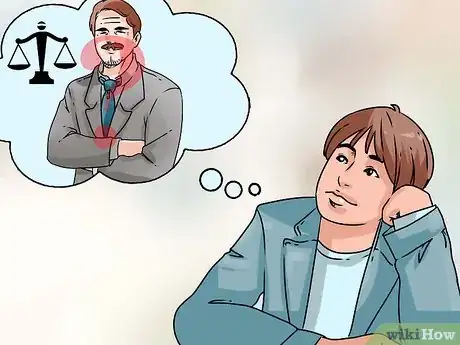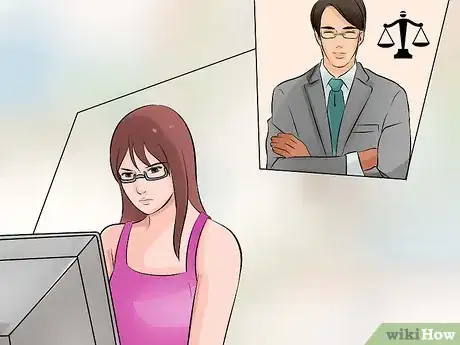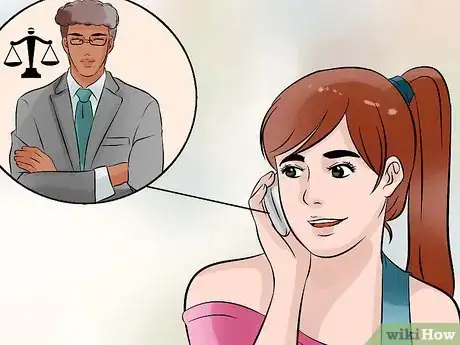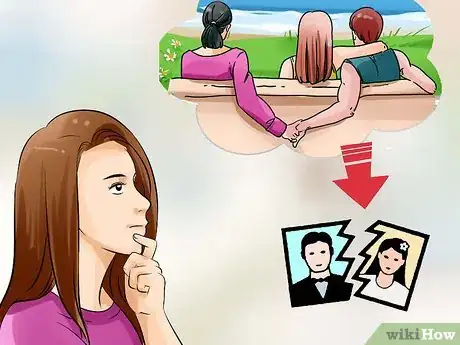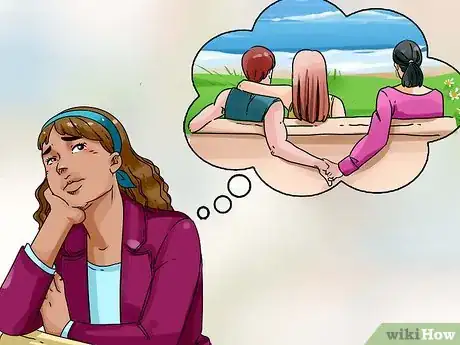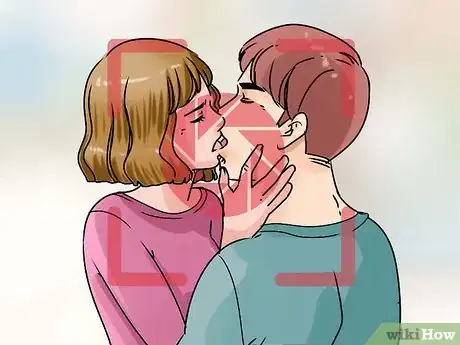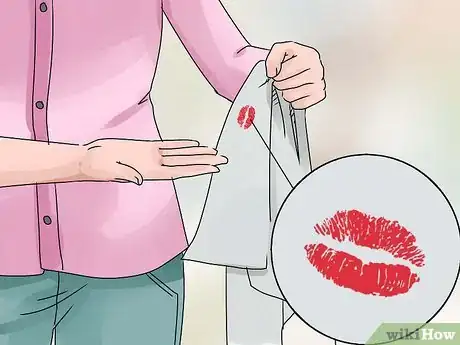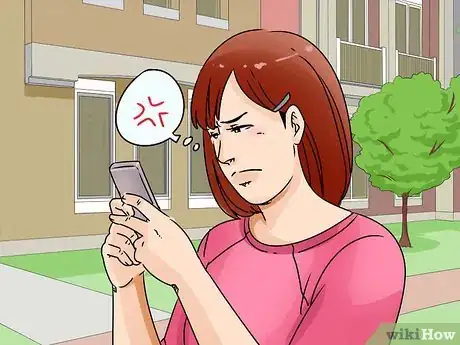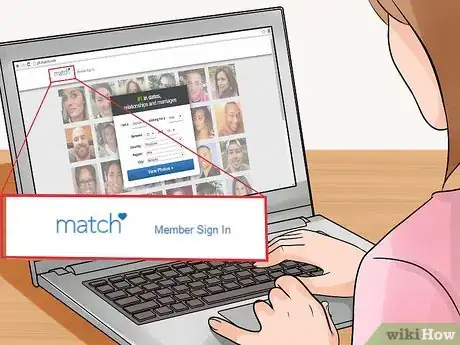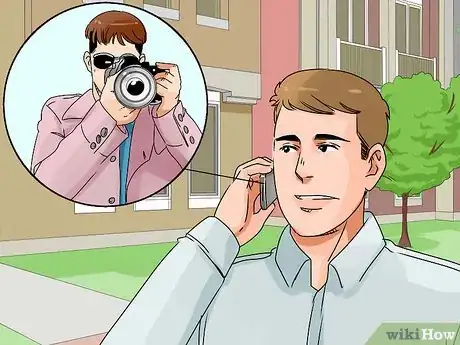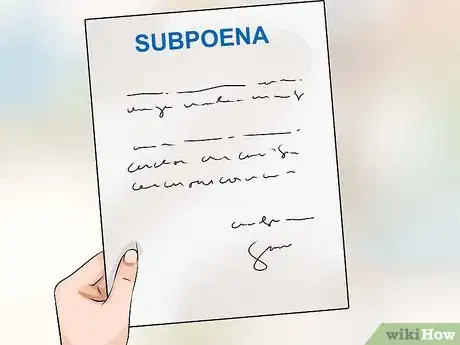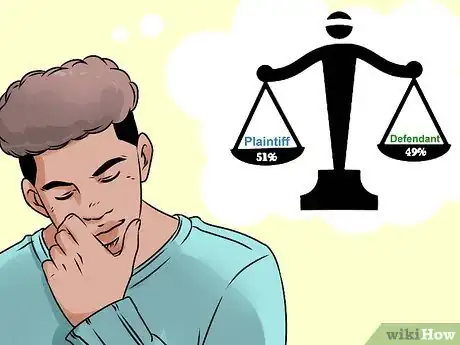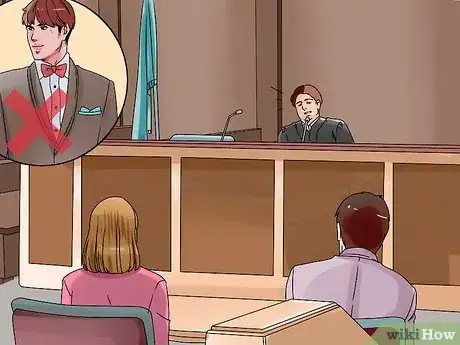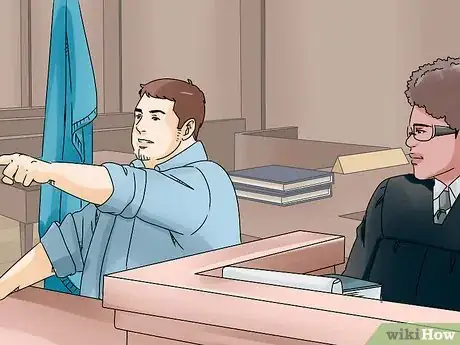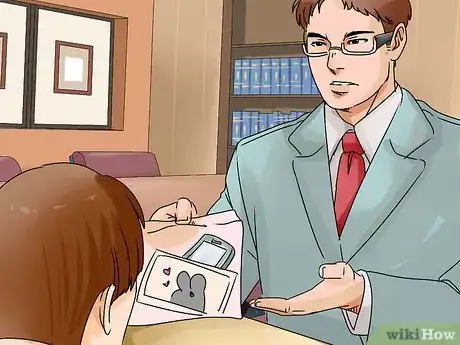This article was co-authored by Clinton M. Sandvick, JD, PhD. Clinton M. Sandvick worked as a civil litigator in California for over 7 years. He received his JD from the University of Wisconsin-Madison in 1998 and his PhD in American History from the University of Oregon in 2013.
There are 9 references cited in this article, which can be found at the bottom of the page.
wikiHow marks an article as reader-approved once it receives enough positive feedback. In this case, 90% of readers who voted found the article helpful, earning it our reader-approved status.
This article has been viewed 257,314 times.
If you and your spouse are considering a divorce, all courts require you to have a valid reason for getting one. Adultery is generally a valid reason in the eyes of a court. If you are going to claim adultery as the reason for your divorce, you are going to have to prove your claim in court. To do so, you will need to know what the law requires, what evidence to look for and retain, and how to present that evidence in court.
Steps
Hiring an Attorney
-
1Decide whether having an attorney is the right choice for you. Hiring an attorney to help you prove adultery in court can be advantageous for a number of reasons, but it can also be a burden. Consider these factors in deciding whether hiring an attorney is the right choice for you:
- Foregoing the help of an attorney may be advantageous if your spouse has openly admitted to cheating. In this situation, an attorney may only hinder your ability to talk honestly and openly with your spouse about all of the issues needing to be resolved. You should also be aware that if you do not have an attorney, you will be responsible for providing evidence to the court about your spouse's adulterous behavior.
- If you do not have direct evidence of your spouse's infidelity and if you need help drafting and filing legal papers, then you should consider hiring an attorney. If your spouse is contesting your allegations, there may be a fight during divorce proceedings over children, property, and/or money. If this sounds like the divorce you might be going through, an attorney can help you craft legal arguments to ensure you get the fairest distribution of assets possible. An attorney will also be helpful when you do not have the time or expertise necessary to produce credible evidence.
-
2Research possible attorney candidates. If you decide you would like to hire a lawyer, start by researching possible candidates. Follow the steps here to choose the right one.
- First, start by asking friends, family, and coworkers for their referrals. A referral can be a great way to obtain a qualified attorney so long as you trust the opinion of the person giving you that referral. If your peers do not know any family law attorneys, look online by using lawyers.com, nolo, or findlaw.[1] [2] [3] All of these websites are great for searching out qualified lawyer candidates.
- Second, once you have found a list of candidates, you should contact and set up an initial consultation with them. An initial consultation will help you get a feel for the attorney by meeting him or her in person and being able to ask them questions about themselves and about your case. Be prepared to pay a consultation fee. These often range from as low as $50 to as high as $500.
-
3Choose an attorney that is right for you. Once you have met with your top candidates, you should follow-up with any of them you have more questions for. Once this process is complete, choose the attorney that you are most comfortable with. Look for an attorney with a fair fee, a good track record of handling family law cases, and a good reputation for honesty and integrity.
- If you find out through your research and discussions that hiring an attorney will be too expensive for you, you can try finding an attorney that will take your case on a pro bono basis (taking on the work without charge). Try contacting your local or state bar association for help finding an attorney free of charge. In addition, there are many legal aid societies and nonprofits that may be able to assist you.
Proving Adultery
-
1Know why you would want to prove adultery. Adultery is generally a valid ground for divorce.[4] Therefore, if you believe your spouse has been cheating on you and you want a divorce, you may need to prove adultery in order to finalize your legal proceedings. Also, in many states, if you are filing a no-fault divorce (meaning neither party is taking responsibility for the divorce), you will need to wait for up to one year before you can file divorce papers.[5] However, if you are filing for a fault-based divorce, which would include a divorce based on adultery, you will be able to file immediately.[6]
-
2Understand the consequences of committing adultery. If your spouse commits adultery and you can prove it in court during divorce proceedings, some states will use the information when deciding issues of alimony and property division.[7] In some states, proving your spouse was adulterous will bar that spouse from collecting spousal support all together.[8]
-
3Know what you need to prove. Proof of adultery is often hard to come by considering the act's nature of secrecy (i.e., you do not usually commit it out in the open for everyone to see).[9] Also, adultery does not necessarily mean that your spouse had sexual intercourse, it could also mean you were sexually intimate.[10] Therefore, most courts do not require proof of the adulterous act itself. Instead, most courts require you to prove:
- First, that your spouse had a disposition to commit adultery.[11] A disposition is a tendency to act in a certain way.[12] In this case, it is a tendency to act in an adulterous manner.
- Second, that your spouse had the opportunity to commit adultery.[13] An opportunity to commit adultery is showing that your spouse had the time and ability to commit adultery in any specific situation.[14]
-
4Use direct evidence. If you have direct evidence, which can be eyewitness accounts or photographs of the adulterous act, then you should be able to prove adultery.[15] However, direct evidence is usually hard to come by because the spouse committing adultery is often keeping a low profile and cheating in private.[16]
- In South Carolina, courts have recognized this difficulty and, like most states, do not require direct evidence in order to establish the charge.[17]
-
5Use circumstantial evidence. In all likelihood, you will have to prove adultery by using circumstantial evidence, which means you will be using certain pieces of evidence to make implications.[18] Your indirect evidence should prove:
- Your spouse had the chance to commit adultery, for example being alone with someone else; and
- Your spouse had the disposition to commit adultery, which means that given the situation, adultery likely took place.[19]
-
6Think about other possible reasonable explanations. When you get to court, if your spouse has a credible explanation for the acts you are alleging amount to adultery, a court may not side with you.[20] Therefore, before you file a fault-based divorce based on adultery, make sure your spouse does not have another reasonable explanation for the acts you believe amount to adultery.
-
7Be careful not to condone the adulterous activities. If you take actions that can be perceived as condoning the adulterous activity, courts may not allow you to claim adultery as valid ground for divorce.[21] Also, if you and your spouse reconciled after you became aware of the adulterous activity, you may not be able to claim it as valid grounds for divorce.[22]
- Condonation and/or reconciliation can be in the form of getting back together with your spouse or writing letters of forgiveness.[23]
Gathering Evidence
-
1Look for letters, texts, or emails. Letters, texts, and emails can be a great way to prove your spouse had an inclination to commit adultery.[24] These things should have information about the adulterous activities your spouse is taking part in. For example, the text could discuss times your spouse was with someone else and a letter from someone else could say they love your spouse and enjoy the time they spend together. These letters should be romantic in nature.[25]
-
2Try to find evidence of online dating. If you have proof that your spouse has signed up for online dating sites like Tinder, match.com, or any similar online resource, you should keep that evidence and present it to the court at the appropriate time.[26]
-
3
-
4Ask friends and family for information. In a lot of adulterous situations, friends and family will know something is going on before you do.[29] If you think something is going on, ask your friends and family. Be aware that while friends and family may know something is going on, they might not have any evidence to support their claims. While their information may still be helpful, it would be best if they had evidence to corroborate their claims.
-
5Look for spousal admissions. If your spouse admits to having an affair or being adulterous, you can use that admission to help prove your case. Ideally, this admission would take the form of a text or email, because you will have tangible evidence of the conversation.
-
6Subpoena records. If you are already taking part in court proceedings, you may be able to request bank records, online records, hotel records and other records that may provide proof of adultery.[30] You cannot subpoena records of a party to the divorce, so you should look to subpoena the records directly from a bank or hotel.[31]
Presenting Evidence in Court
-
1Know the standard of proof. When you are in court, you will need to prove the adultery by a "preponderance of the evidence."[32] This is the type of evidence that tends to prove the matter you are asserting.[33] In general, this means that you must convince the judge that the adultery more likely than not took place (i.e., 51%).[34]
-
2Understand that your spouse does not need to testify. In court, your spouse has the right to not incriminate herself, which means she may not have to testify in court.[35] Also, the court will not infer any bad behavior if your spouse chooses not to testify.[36] Therefore, do not rely on your spouse's potential testimony to prove a case of adultery.
-
3Have people testify in court. If you have received help from friends, family, or private investigators, you will want them to testify in open court. When this happens, they will testify to what they themselves saw that made them believe that adultery was occurring.
-
4Submit records into evidence. Apart from asking people to testify, you can also submit records into evidence. To do so, you will need to follow the rules of evidence in your state. If a piece of evidence is admissible, you will be able to show it to the judge and use it as proof of adultery.
References
- ↑ http://www.lawyers.com/
- ↑ http://www.nolo.com/
- ↑ http://www.findlaw.com/
- ↑ https://www.lawyers.com/legal-info/family-law/divorce/grounds-for-divorce-adultery.html
- ↑ http://www.divorcenet.com/states/virginia/proving_extramarital_sex_in_va
- ↑ http://www.divorcenet.com/states/virginia/proving_extramarital_sex_in_va
- ↑ https://www.lawyers.com/legal-info/family-law/divorce/grounds-for-divorce-adultery.html
- ↑ http://www.divorcenet.com/states/virginia/proving_extramarital_sex_in_va
- ↑ https://www.gregoryforman.com/faqs/how-does-one-prove-adultery/
- ↑ https://www.gregoryforman.com/faqs/how-does-one-prove-adultery/
- ↑ https://www.gregoryforman.com/faqs/how-does-one-prove-adultery/
- ↑ http://www.merriam-webster.com/dictionary/disposition
- ↑ https://www.gregoryforman.com/faqs/how-does-one-prove-adultery/
- ↑ http://www.charlestonlaw.net/proving-adultery-charleston-divorce-attorneys/
- ↑ https://www.lawyers.com/legal-info/family-law/divorce/grounds-for-divorce-adultery.html
- ↑ https://www.lawyers.com/legal-info/family-law/divorce/grounds-for-divorce-adultery.html
- ↑ https://www.gregoryforman.com/faqs/how-does-one-prove-adultery/
- ↑ https://www.lawyers.com/legal-info/family-law/divorce/grounds-for-divorce-adultery.html
- ↑ https://www.lawyers.com/legal-info/family-law/divorce/grounds-for-divorce-adultery.html
- ↑ http://www.divorcenet.com/states/virginia/proving_extramarital_sex_in_va
- ↑ http://www.charlestonlaw.net/proving-adultery-charleston-divorce-attorneys/
- ↑ http://www.charlestonlaw.net/proving-adultery-charleston-divorce-attorneys/
- ↑ http://www.charlestonlaw.net/proving-adultery-charleston-divorce-attorneys/
- ↑ http://www.charlestonlaw.net/proving-adultery-charleston-divorce-attorneys/
- ↑ http://www.charlestonlaw.net/proving-adultery-charleston-divorce-attorneys/
- ↑ http://www.charlestonlaw.net/proving-adultery-charleston-divorce-attorneys/
- ↑ http://www.charlestonlaw.net/proving-adultery-charleston-divorce-attorneys/
- ↑ http://www.charlestonlaw.net/proving-adultery-charleston-divorce-attorneys/
- ↑ http://www.charlestonlaw.net/proving-adultery-charleston-divorce-attorneys/
- ↑ http://www.charlestonlaw.net/proving-adultery-charleston-divorce-attorneys/
- ↑ http://www.charlestonlaw.net/proving-adultery-charleston-divorce-attorneys/
- ↑ https://www.gregoryforman.com/faqs/how-does-one-prove-adultery/
- ↑ https://www.gregoryforman.com/faqs/how-does-one-prove-adultery/
- ↑ https://www.law.cornell.edu/wex/preponderance_of_the_evidence
- ↑ http://www.divorcenet.com/states/virginia/proving_extramarital_sex_in_va
- ↑ http://www.divorcenet.com/states/virginia/proving_extramarital_sex_in_va
About This Article
To prove your spouse is cheating in court, you’ll need evidence of their infidelity. This could be romantic letters or texts between your spouse and someone else, or a text to you admitting their affair. You might even have photos of them kissing someone else. Or, if you find a secret online dating profile they made, this would count as direct evidence. Alternatively, if someone you know saw your spouse cheating or overheard her confessing to it, their report can also count as evidence. It’s not always easy to find physical evidence, but you might be able to use circumstantial evidence. This will prove that your spouse had the opportunity and the disposition to commit adultery, even without hard evidence. For example, they might have sent you a text saying, “Maybe we should see other people,” and then lied about working late that night while they hung out with a friend. For more tips from our Legal co-author, including how to present your evidence in court, read on.
